Why Hospital Waste Management is Important
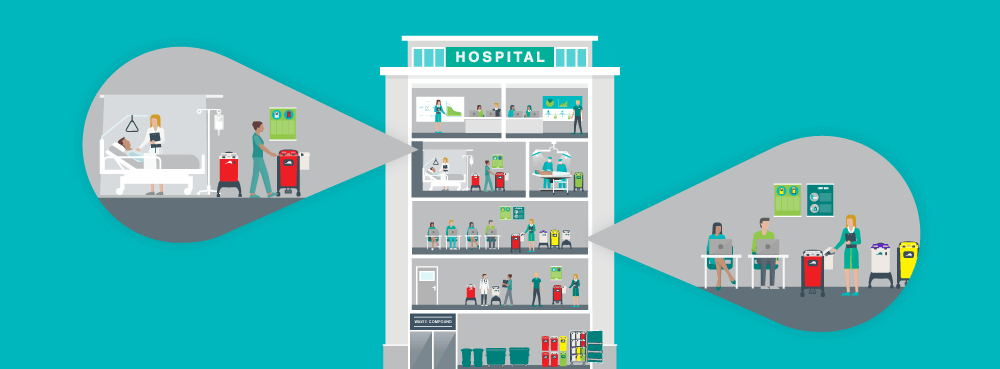
Each person working in a hospital setting can be impacted by hospital waste management – and each person should be provided with training and education on how healthcare waste handling and disposal processes directly impacts infection control.
In this blog we will be covering:
1 / Hospital Waste Management Definition
2 / Importance of Waste Management in Hospital
3 / Hospital Waste Management Tips
4 / Benefits of Modern Waste Management in Hospitals
5 / Key Challenges in Hospital Waste Management and Employee Training
6 / Ensuring Compliance: Your Key Responsibility in Hospital Waste Management
Hospital waste management definition
Hospital waste management is defined as the systematic handling, segregation, treatment, and disposal of waste generated in healthcare settings. This includes everything from general waste to more hazardous materials such as sharps, pharmaceuticals, and chemical waste. The goal is to ensure environmental safety, compliance with medical waste regulations, and the protection of healthcare workers and patients.
Importance of waste management in hospitals
Hospital waste management is not a one-size-fits-all solution
The importance of medical waste management is not to be understated. This is because various types of healthcare waste are generated by every department in a hospital, from the janitorial and housekeeping staff to surgical suites, infectious disease units, and so forth. The same thing can be said about Skilled Nursing communities – each facility has unique needs that vary due to the amount of beds, the procedures performed, and the specialties of healthcare.
Daniels Health takes the time to observe your current processes and complete waste audits before proposing any changes. We meet you where you are and build an improvement plan from there.
Hospital Waste Management Tips
Begin with an “Inside the Four Walls” approach
We work directly with clinical staff to drive better healthcare waste management. Through training, container placement and process improvement within the four walls, we influence safety, alter segregation behaviors, enhance efficiencies and drive substantial cost benefits for our customers.
Our “Inside the Four Walls” approach, used for both acute and non-acute facilities across the US, centers around:
- Safety Infection and Risk Minimization
- Waste Optimization
- Compliance and Education
- Position and Movement
- Storage Optimization
To learn more about our “Inside the Four Walls” approach, click here.
Education on Hospital Waste Management
We know that education is the key to awareness and proper implementation of healthcare waste segregation and disposal processes inside healthcare facilities. Notable initiatives include recognizing various healthcare waste stream sources and conducting regular healthcare waste audits. These practices are essential components of effective waste management in hospitals, ensuring both safety and compliance.
At Daniels Health, we want to work with you and your staff to ensure everyone feels confident in compliantly disposing of healthcare waste. We are your partner; not just another “bag and a box” medical waste disposal company.
Adopt Simplified Healthcare Waste Management Solutions
We make healthcare waste segregation easy by implementing our bold, reusable containment systems. They are color-coded and optimally placed to help you quickly and safely dispose of healthcare waste.
Implementing our reusable solutions goes beyond education and enforcement of healthcare waste segregation – by choosing Daniels you are reducing the volume of single-use plastic medical waste or sharps containers going to landfills. You are choosing to move your hospital or healthcare facility in a more sustainable direction.
Benefits of Modern Waste Management in Hospital
At its foundation, hospital waste management increases the safety of employees and patients by minimizing the likelihood of sharps injuries and the associated costs of direct and indirect treatment. The proper management of waste also reduces the risk of exposure to bloodborne pathogens and reduces hospital-acquired infections (HAIs).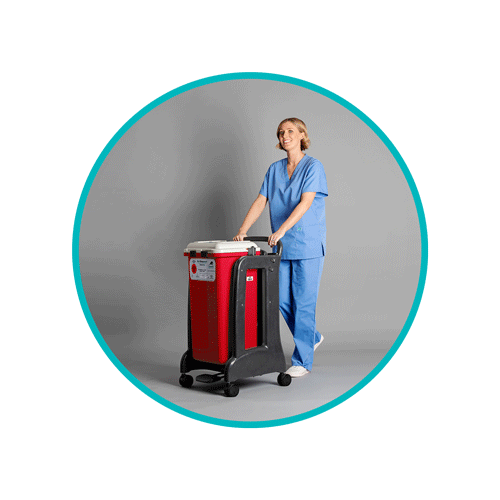
Minimizing Touch in Hospital Waste Management
Nowadays, we are all hyper-aware of how much we are touching any and all surfaces. A modern hospital waste management plan includes solutions that minimize touch. Daniels Health reusable containment systems are either wall-mounted, or on a mobile cart for point-of-use disposal. Our systems should only be touched twice: once placing an empty container in its designated location and secondly when the container is full – permanently locking it to place in a soiled utility room or loading area.
Enhancing Safety
Not only do we specialize in containers that reduce touch – they are Safety Engineered Devices. Our Sharpsmart alone is peer-reviewed to prevent the risk of container-associated sharps injuries by over 80%!
Healthcare personnel in the US experience over 300,000 needlestick and/or other sharps-related injuries every year. Today the focus is not only on minimizing environmental waste, but increasing worker safety.
Increased Efficiency and Compliance
We know change can be scary and vigilant healthcare waste segregation can feel time-consuming. Nevertheless, enhanced education and improved reporting procedures not only increases efficiency but ensures compliance to federal and state guidelines.
Key Challenger in Hospital Waste Management and Employee Training
Proper training in waste segregation and effective on-site management of hazardous waste are among the most critical aspects of hospital waste management.
Are your employees confident in the difference between the variety of healthcare waste streams you generate? We’re talking:
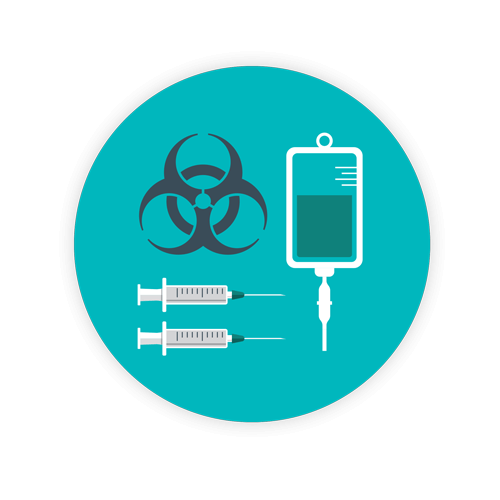 Chemotherapy waste
Chemotherapy waste- Sharps waste
- Biohazard waste
Are they confident in the safe disposal of medicinal and non medicinal sharps? Have they used point-of-use disposal systems before? Daniels Health emphasizes the “less touches equals less risk” approach. Do your hospital employees know how sharps waste is defined? Sharps don’t just reference needles (ISO standard 23907:2012), but include:
- Empty ampoules
- Razor blades
- Scalpels
- Suture needles
- Butterflies
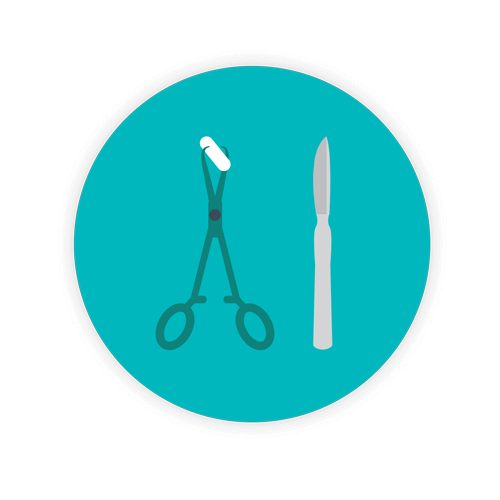
- Culture slides and dishes
It is up to you to ensure that your Cradle to Grave responsibilities are upheld. As the waste generator, you are legally responsible to properly segregate and dispose of healthcare waste with a management partner of your choice. Daniels Health has proudly supported US healthcare with reliable service for over 30 years – giving many peace of mind that their waste been properly treated.
Improper waste segregation and an overall lack of awareness costs hospitals tens of thousands of dollars a year. This is because some throw away a bulk of their waste into their biohazardous waste stream – even if it’s not biohazard waste. One New York City hospital started an aggressive medical waste reduction program and shaved nearly one million dollars annually off their waste disposal costs!
Know the healthcare waste streams
Hospitals, surgery centers, dentists – whatever your size – your facility must be able to follow the trail proper waste segregation to ensure all the streams you generate are treated correctly. This is one of the many reasons why choosing a healthcare partner you can trust is so important – they need to understand your waste at a deep level.
It’s essential for hospitals to have policies and procedures in place that regulate the handling and implementation of healthcare waste and the volume and type of waste generated. Just because something is “disposable” doesn’t mean that it doesn’t have to be handled properly in regard to segregation.
If you are unsure where you can improve your facility’s waste management plan – begin with a waste audit. This can be done in-house by your team or in partnership with your healthcare waste services partner. Waste audits are an integral part of healthcare waste management and aid hospitals in determining the difference between clinical waste and non-clinical waste, as well as the proper segregation of waste streams.
Every hospital should have a plan in place to deal with their medical waste. For example, hospitals around the country have implemented best-practices approaches to deal with medical waste. Some of the topics covered include:
- Biomedical waste management
- Solid waste management
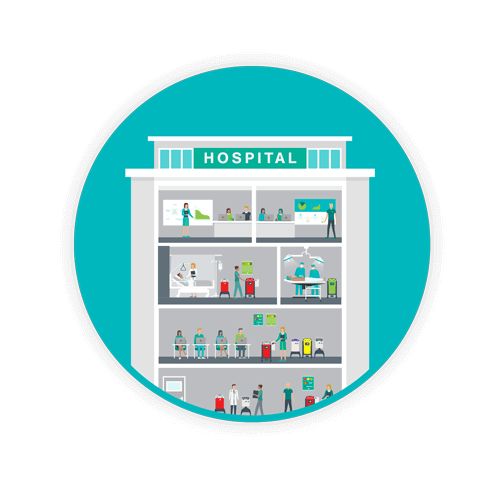
- Self-auditing for different medical waste streams
Every department within the hospital – from administration to janitorial – are given specific guidelines and instructions. Washington State created their best-practices guide for medical waste years ago. For example, the anesthesia department is instructed to handle spent charcoal filters as dangerous waste. The clinical research department was mandated to manage their chemicals and waste properly through the use of closed, clearly labeled, and dated containers stored in secured areas.
They took it further and required that secondary containment before proper disposal was needed in certain scenarios. The housekeeping department was provided very specific guidelines on the segregation and storage of solid, biomedical, and dangerous waste as well as recyclables.
Ensuring Compliance: Your Key Responsibility in Hospital Waste Management
The responsibility of adhering to federal and state guidelines for healthcare waste management and disposal belongs to the waste generator. Penalties and fines can be incurred even after medical waste leaves your hospital. Until its final disposition, it’s your responsibility.
With over 30 years of experience, we have the expertise to maintain your compliance and be a long-term partner. Our sustainable and efficient hospital waste management solutions put safety of employees and the environment first. Our Safety Engineered Devices are proven to reduce sharps injuries, lower your carbon footprint, and increase efficiency with disposal.
The ever-evolving needs of Hospital healthcare waste management can be daunting, but as your partner, we can tackle it together – and well! To speak to one of our team members about how Daniels can help your hospital, click here.
Let's Talk!
Your time is valuable, and we don’t want to play hard to get. You can either phone us directly on the details listed on our contact page, or feel free to fill out this short form and one of our team members will get back to you as quickly as possible.
